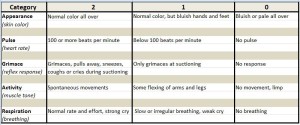
What Does a Newborn’s APGAR Score Mean?
The APGAR score (also called “newborn scoring”) is the first test that your newborn baby will ever be given. It is performed in hospitals throughout the world by the doctor, midwife or nurse. It is usually done twice, at 1 minute after birth, then again at 5 minutes. Occasionally, if the baby does not appear to be doing well, or the score was low at 5 minutes, the test may be done a third time 10 minutes after birth.
The APGAR scores are simply a way for the healthcare provider to quickly assess a newborn’s physical condition, and determine whether extra medical or emergency care is needed. The tests indicate if the infant needs help breathing or is having heart trouble.
The scores measure a newborn’s overall appearance, pulse (heart rate), breathing, muscle tone and responsiveness. An infant is given between 0 and 2 points on each of those 5 categories each time the test is done, for a combined possible total of between 0 and 10 points on each test. Though a 10 is considered a “perfect” score, almost no infant obtains that, as most newborns lose a point or two for having bluish feet and hands, which are common when a baby is first born, until they warm up. Therefore, most babies score around 8 points, and they are considered in good health when they receive that number.
The APGAR score was developed in 1952 by American obstetric anesthesiologist Virginia Apgar — hence the name of the test. But to make it easier to remember the categories tested, APGAR is used as an acronym, and stands for:
- A: Activity — baby should be moving limbs around, not be limp
- P: Pulse — heart rate should be more than 100 beats per minute
- G: Grimace — strong reflexive responses to stimuli
- A: Appearance — skin color should look normal, not bluish or pale
- R: Respiration — strong cries or steady, regular breathing indicate health
The One-Minute APGAR Score
The one-minute APGAR assessment helps the doctor know if an infant requires immediate medical attention. A baby who gets from 7 to 10 points is usually in good shape and should not need more than routine post-delivery care. A baby who scores between 4 and 6 may need help breathing; he or she might just need something simple like suctioning of the airways or a massage to stimulate a good breathing rate, or the newborn might need oxygen. A score of 3 or less may indicate that the baby needs to be resuscitated. The lower the score below seven, the more assistance the baby needs.
A low one-minute APGAR score does not necessarily mean that your baby won’t do well eventually; for example, babies born by caesarean, prematurely, after a high-risk pregnancy or after a complicated labor and delivery, may have low scores, especially at one minute after birth, but then go on to be healthy.
Sometimes, a low initial score can raise the chances that an infant may encounter health challenges later on; however, most babies who score a little low on their initial APGAR test go on to be healthy.
The Five-Minute APGAR Score
Through the second APGAR assessment, 5 minutes after birth, the doctor is able to gauge how the newborn is progressing, and whether any medical steps that were taken initially have been successful. A score of 7 to 10 is still considered normal at this point. If the infant gets a 6 or less, he or she may require further medical intervention, and the doctor will determine at that time what steps may be needed.
Most of the time, a lower score at the 1-minute test will be near normal at the 5-minute test.
How the Five APGAR Categories Are Scored
These are the criteria doctors use to determine whether a baby gets a 2, a 1 or a 0 in each of the five categories scored:

It is a good idea for parents to keep in mind that the APGAR scores were not intended to predict a baby’s long-term health, intelligence, behavior or personality. A lower score does not mean your baby will have serious or long-term health difficulties. So, if your newborn doesn’t or didn’t get a perfect 10 on his or her scores, just remember most babies don’t.
By Cynthia Sanchez. A graduate of the University of Washington, Cynthia has extensive experience writing about health and wellness topics for different media.